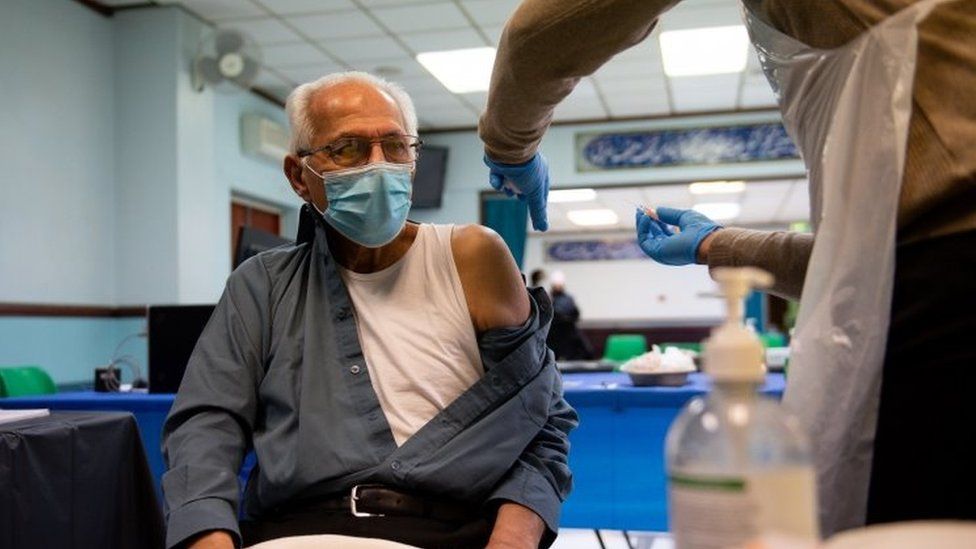
It is "too early" to say whether England's Covid restrictions will be able to end in the spring, Prime Minister Boris Johnson has said.
Once the four priority groups have been vaccinated, by mid-February, "we'll look then at how we're doing", he said.
Nearly two million people in the UK have had their first dose of vaccine the past week, government figures show.
Labour leader Sir Keir Starmer said it was an "impossible question" to say how long the lockdown would need to last.
He said the coronavirus vaccines were "really good news" but "should not mask the fact that we have still got a very serious problem".
Speaking during a visit to Didsbury in Manchester, Mr Johnson said it was "absolutely crucial" that people observed the lockdown restrictions.
Referring to figures from an Imperial College London survey, he said they showed the new variant of the virus was "not more deadly but it is much more contagious and the numbers are very great".
The government is aiming to offer a vaccine to all over 70s, the extremely clinical vulnerable and health and care workers by mid-February.
By the end of Tuesday 4.61 million people had received their initial jab, up from 2.64 million the week before, with people being vaccinated at a rate of 200 a minute, according to Health Secretary Matt Hancock.
Sixty-five new vaccination centres are opening in England, including a mosque in Birmingham and a cinema in Aylesbury.
It comes after scientists warned of "immense pressure" on the NHS after a study showed infections in the community increased at the start of the latest lockdown in England.
And one in 10 major hospital trusts had no spare adult critical care beds last week, NHS England figures show.
The UK recorded another all-time high of daily coronavirus deaths on Wednesday, with 1,820 people reported to have died within 28 days of a positive Covid test.
'Huge endeavour'
Giving a statement in the Commons, Mr Hancock said the country had an "immense infrastructure in place that, day by day, is protecting the vulnerable and giving hope to us all".
Describing this as a "huge feat", he said the government was making "good progress" towards its vaccination target.
He said: "This virus is a lethal threat to us all and as we respond through this huge endeavour let's all take comfort in the fact we're giving 200 vaccinations every minute, but in the meantime everyone, everyone must follow the rules to protect the NHS and save lives."
Asked about difficulties in getting vaccines to rural areas and whether the Oxford-AstraZeneca could be prioritised for these as it is easier to store, Mr Hancock said the challenge was that supply was "lumpy", with manufacturers working "as fast as possible".
Shadow health secretary Jonathan Ashworth said new variants of the virus showed vaccination needed to go "further and faster". He asked if there was a contingency plan in place in case vaccines needed to be redesigned to contain mutations.
Mr Hancock said the early indications were that the new variant was dealt with by the vaccine "just as much as the old variant but of course we are vigilant to the new variants that we're seeing overseas".
He also said that 63% of residents in elderly care homes had now received a vaccine.
Former Conservative health secretary Jeremy Hunt, who is now chairman of the Common's Health Select Committee, asked about establishing "quarantine hotels" to combat new strains, as well as whether there should be further restrictions on household mixing outside bubbles and mandating FFP2 masks in shops and on public transport.
Mr Hancock said the clinical advice was that the current guidelines on personal protective equipment (PPE) were "right and appropriate" and said "very significant measures" had been brought in for international travel.

- TESTING: How do I get a virus test?
- LOOK-UP TOOL: How many cases in your area?
- YOUR QUESTIONS: We answer your queries
- THE R NUMBER: What it means and why it matters
- TEST AND TRACE: How does it work?

In Northern Ireland more than 160,000 people have received a first vaccine dose, while in Wales, where more than 175,000 people have received a jab, people waiting for theirs have been urged to show "patience" and "perspective".
Scotland's First Minister Nicola Sturgeon insisted her country's vaccine programme was not lagging behind, during First Minister's Questions on Wednesday.
In England the rollout of the vaccine started with people aged 80 and over. In some regions where the majority of these have been vaccinated, the programmes are now moving on to the over-70s.
Home Secretary Priti Patel, who will lead a Downing Street press conference later, said ministers were working to ensure police and other front-line workers are moved up the priority list, while Education Secretary Gavin Williamson told BBC Breakfast he hoped teachers and support staff could be moved up the list.
Meanwhile, pumps and sandbags were brought in to protect supplies of the Oxford-AstraZeneca vaccine from the risk of flood water at a warehouse in Wrexham, north-east Wales.
And young people in Wales have been asked to share their experiences of the pandemic in a survey by the nation's Children's Commissioner.

- DOCTOR CHATTERJEE: With another lockdown in place, how can we manage our health and wellbeing without feeling overwhelmed?
- RADIO 1 BREAKFAST BEST BITS: What's Greg James been up to?

https://news.google.com/__i/rss/rd/articles/CBMiJmh0dHBzOi8vd3d3LmJiYy5jby51ay9uZXdzL3VrLTU1NzUxOTE10gEqaHR0cHM6Ly93d3cuYmJjLmNvLnVrL25ld3MvYW1wL3VrLTU1NzUxOTE1?oc=5
2021-01-21 13:25:00Z
52781320305597
Tidak ada komentar:
Posting Komentar